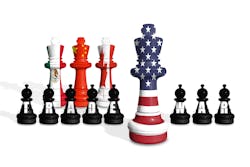Condemnation of Trump's New Tariffs from Auto, Consumer Goods Groups
Editor's Note: President Trump, Mexican President Claudia Sheinbaum and Canadian Prime Minister Justin Trudeau have agree to one-month pauses on the tariff implementation, following calls on Monday.
Automotive, consumer goods, trade groups and some labor unions sharply condemned President Donald Trump’s new tariffs on Canada and Mexico, saying they will harm U.S. manufacturing, slow the economy and raise prices on a wide range of goods.
“A 25% tariff on Canada and Mexico threatens to upend the very supply chains that have made U.S. manufacturing more competitive globally,” National Association of Manufacturers President and CEO Jay Timmons said. “The ripple effects will be severe, particularly for small and medium-sized manufacturers that lack the flexibility and capital to rapidly find alternative suppliers or absorb skyrocketing energy costs. These businesses—employing millions of American workers—will face significant disruptions.”
Trump, on Saturday, ordered 25% tariffs on Mexican and most Canadian goods sent to the United States with 10% added to Canadian oil and gas. And, the administration plans to increase tariffs on Chinese goods by another 10%. The new import fees will go into place on Tuesday, Feb. 4.
More on Trump and Tariffs
Donald Trump made imposing new, steep tariffs on trading partners a major part of his presidential run in 2023 and 2024.
The president had made tariff increases a central promise of his reelection campaign and had floated the 25% figure on North American imports for several weeks. Many trade groups took that to be an opening offer in negotiations, not a serious proposal. However, the president followed through on the threats, saying Canada, Mexico and China needed to do more to stop fentanyl and other illegal drugs from flowing into the U.S.
Automotive Impacts
The U.S. automotive industry has been on particularly high alert for possible North American tariffs as the industry is integrated throughout the continent. Vehicle components from each country cross the border multiple times before being assembled into a final vehicle. And, American-made parts go into finished products from Canada and Mexico.
“Such tariffs would have severe consequences for the U.S. vehicle supplier industry, jeopardizing American jobs, increasing costs for consumers and undermining the highly integrated North American supply chain that is critical to U.S. competitiveness,” said officials from MEMA, the Vehicle Suppliers Association, calling the tariffs “a direct threat to American jobs and manufacturing.”
MEMA officials, during Trump's first term, supported his renegotiation of the North American Free Trade Agreement (NAFTA) into the U.S.-Mexico-Canada Agreement (USMCA), and adds that the Administration should be putting its efforts into updating that pact, not instituting new tariffs on allies.
“Canada and Mexico are the United States’ top automotive trade partners, forming the backbone of a resilient, North American-centered supply chain. Since the implementation of USMCA, regional trade has grown stronger, reducing reliance on China and reinforcing North American economic security,” MEMA officials said. “Tariffs would upend this progress, forcing companies to reevaluate supply routes and delay production.”
None of the major automakers released statements about the tariffs, but during its fourth-quarter earnings call last week, General Motors executives faced several questions on how the company would deal with tariff threats. CEO Mary Barra said at the time that the company was waiting for specifics but said there were things it could do to handle new trade actions.
“We do build trucks in Mexico and in Canada and in the United States. And so, we have the capacity in the United States to ship some of that,” Barra said. “We also sell trucks globally, and so we can look at where the international markets are being sourced from. So, there's plays that we can do on that perspective to minimize the impact if there are tariffs either on Canada or Mexico.”
Still, she added that she hoped a trade war could be averted, saying GM was encouraged by Mexican President Claudia Sheinbaum’s statements last week that Mexico was working with the Trump administration to avoid new tariffs, something that clearly did not happen in time to prevent Saturday’s executive orders.
Last month, former GM executive and regular IndustryWeek contributor Warren Browne expressed concerns about Trump tariffs on Canada and Mexico, saying they wouldn’t likely force automakers to move production back to the United Sates, at least no immediately.
“History has shown that tariff-induced supply chain changes take time to produce results. The 1981 Voluntary Export Restraint program lasted more than 10 years—and during that time, Japanese manufacturers installed significant capacity into the North American market. It didn’t happen overnight,” Browne wrote.
“Disrupting import pricing with tariffs (including parts pricing) will lead to a natural increase in domestic pricing. More to the point, home-market producers tend to use the tariff umbrella to boost prices and improve their own margins,” Browne added. “Overall, first-quarter tariff increases will lead to a reduction in U.S. production as early as the second half of 2025. The size of the reduction will depend on the size and scope of the tariff.”
Other Manufacturing Sectors
Also criticizing the new tariffs were consumer product goods (CPG) makers, the companies that produce food, cleaning supplies and a wide array of consumable products found in every home in the country. The Consumer Brands Association notes that while most CPG companies make their products domestically with U.S.-sourced ingredients, there are some things that they just can’t get domestically.
“Tariffs on all imported goods from Mexico and Canada – especially on ingredients and inputs that aren’t available in the U.S. – could lead to higher consumer prices and retaliation against U.S. exporters,” said Tom Madrecki, vice president of supply chain resiliency at the Consumer Brands Association. “We urge leaders in Mexico and Canada to work with President Trump to protect consumers’ access to affordable products and remove tariffs that could contribute to grocery inflation.”
Canada and Mexico have promised to enact their own tariffs against U.S.-made goods in response to Trump’s actions, something that concerned farm groups. The American Farm Bureau President Zippy Duvall last week sent Trump a letter, discouraging the president from enacting the tariffs, saying they could make it difficult to sell U.S. goods abroad.
“Last year, the U.S. exported over $30 billion in agricultural products to Mexico, $29 billion to Canada and $26 billion to China – our top three markets by value combined for half of total agricultural exports,” Duvall said in his letter. “Any effort to impose additional tariffs on these nations’ imports runs the risk of significant retaliatory measures against U.S. agricultural exports.”
Duvall also noted that Canada supplies U.S. farmers with much of the fertilizer used on crops, and “increases to the cost of these necessary products, with spring planting soon starting across rural America, would be a difficult and untimely burden on American farmers.”
Labor unions, which have been supported of tariffs in the past, were mixed on the latest round. United Steelworkers President David McCall, was against the action, saying U.S. and Canadian steel operations are too integrated with each other, so damage to the trade agreement could threaten U.S. jobs. He instead encouraged Trump to go after China and other countries.
“Approximately $1.3 trillion worth of goods cross the Canada-U.S. border annually, supporting 1.4 million American jobs and 2.3 million Canadian jobs,” McCall said. “These tariffs… threaten the stability of industries on both sides of the border.”
United Auto Workers President Shawn Fain, however, was ambivalent.
“The UAW supports aggressive tariff action to protect American manufacturing jobs as a good first step to undoing decades of anti-worker trade policy. We do not support using factory workers as pawns in a fight over immigration or drug policy,” Fain said. He added that the union supports tariffs to protect U.S. jobs, but accused the Trump administration of acting against workers’ interests by gutting the National Labor Relations Board.
He encouraged Trump to renegotiate trade deals, not to use North American manufacturing in the Administration’s fight against immigration and drug trafficking.
“The national emergency we face is not about drugs or immigration, but about a working class that has fallen behind for generations while corporate America exploits workers abroad and consumers at home for massive Wall Street paydays,” Fain said. “We need to stop plant closures, bring back American jobs, and stop the global race to the bottom immediately.”
Few Supporters
Most of the statements released immediately before and after Trump’s Saturday actions criticized the new tariffs. Several right-wing think tanks that often support administration policies remained silent following the action.
In late January, Hudson Institute President John P. Walters and former U.S. Attorney General William P. Barr, co-wrote an opinion piece encouraging the tariffs on Mexico and China, saying the U.S. needed to use its economic might to squash drug trafficking.
“The U.S. has a golden opportunity because the supply chain for drugs poisoning America has become highly concentrated and vulnerable. It depends entirely on illegal activities in two countries – the manufacture of illicit drugs in Communist China, and drug processing and distribution operations in the cartels’ safe havens in Mexico,” Barr and Walters wrote.
The Coalition for a Prosperous America, an advocacy group that has long fought against free trade agreements, praised Trump’s actions, saying accusations that the tariffs would raise prices were alarmist.
CPA Chairman Zach Mottl wrote, “These fearmongering arguments come from the same economists funded by multinational corporations who have been dead wrong on trade policy for decades. They’re the same ‘experts’ who told us that NAFTA would create nearly 200,000 jobs, but instead, it wiped out 1 million American jobs. They said Permanent Normal Trade Relations (PNTR) with China would be a win for the U.S., but their predictions were off by a factor of seven—and it led to the biggest industrial collapse in modern history.”
About the Author
Robert Schoenberger
Editor-in-Chief
LinkedIn: linkedin.com/in/robert-schoenberger-4326b810
Bio: Robert Schoenberger has been writing about manufacturing technology in one form or another since the late 1990s. He began his career in newspapers in South Texas and has worked for The Clarion-Ledger in Jackson, Mississippi; The Courier-Journal in Louisville, Kentucky; and The Plain Dealer in Cleveland where he spent more than six years as the automotive reporter. In 2014, he launched Today's Motor Vehicles (now EV Manufacturing & Design), a magazine focusing on design and manufacturing topics within the automotive and commercial truck worlds. He joined IndustryWeek in late 2021.


